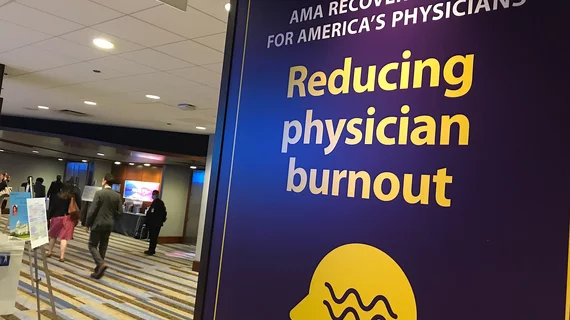How mental health conditions are affecting cardiologists
In a survey of nearly 6,000 cardiologists, more than 1 in 4 say they experience mental health conditions (MHCs). The cardiologists also report the association with MHCs led to substantial adverse experiences in their professional life. The study was published online this past week in. The Journal of the American College of Cardiology.[2]
Mental illness among physicians is an increasingly recognized concern, but it is a subject many do not want to acknowledge or discuss because of the public perceptions about mental health issues, physicians being held to a high standard, and concerns about how these issue may impact their clinical decision making.
The purpose of this study was to investigate the global prevalence of MHCs among cardiologists and its relationships to professional life. The American College of Cardiology (ACC) conducted an online survey with 5,931 cardiologists globally in 2019. Data on demographics, practice, MHC and association with professional activities were analyzed.
The key findings include a 28% overall prevalence of MHCs among cardiologists, with women more commonly reporting MHCs than men (34% vs 26%). Men reported alcohol or drug use disorder more frequently, whereas women reported psychiatric disorders. An equal proportion of men and women (0.4%) reported attempting suicide, but women were more likely to report considering suicide in the past. Afflicted respondents were also more likely to be younger than 40 years of age, divorced or in mid-career. A hostile work environment was acknowledged by an alarmingly high proportion (42%) of respondents experiencing MHCs.
Emotional harassment, discrimination, divorce, and age younger than 55 years were the most notable clinically relevant predictors of a MHC. The study found a staggering 84% of men and 78% of women among the 1,648 with MHCs responded that they had not reported their MHC, whereas 31% of men and 42% of women answered that they had not sought help for addressing their MHC. When asked about barriers to reporting, lack of privacy was the most highly cited, followed by a lack of time, embarrassment, and concern for detrimental impact on professional advancement
Nearly one-half of cardiologists reporting MHCs (44%) felt dissatisfied on at least one professional metric including feeling valued, treated fairly and adequate compensation.
"We highlight the need for the culture of cardiology to be more inclusive and supportive of those affected and encourage them to report their illness and seek treatment. Given the high prevalence of mental health disorders among cardiologists globally, dedicated efforts are needed," the authors wrote in their conclusion.
The authors said dedicated efforts toward prevention and treatment are needed to maximize the contributions of affected cardiologists.
"Pursuing a career in cardiology can be a master class in delayed gratification and quiet suppression of self-care," explained Andrew J. Sauer, MD, a heart failure and heart transplant specialist at Saint Luke’s Mid America Heart Institute, Kansas City, Missouri, who wrote an editorial on the study.[2] "We commonly defer life timelines, including debt reduction, investing, marriage, parenting and so on, all in the spirit of commitment to patient-care excellence. And the intrinsic rewards of easing the suffering of our patients while experiencing the enrichment of the patient-doctor relationship cannot be understated. But medicine is increasingly isolating for many."
Sauer said burnout, including emotional exhaustion, depersonalization, professional apathy, psychological distress, overt mental illness and suicidal thoughts are legitimate concerns and threats to physician well-being. For physicians to offer the best care, someone must also care for the doctors, because they are real people and patients too.
He said there is sometimes covert gaslighting and shaming of struggling subordinates by those who wield authority within the health system, which compounds the problem.
"Cardiologists are trained to cope alone, silently, lest they risk being perceived as weak, mediocre, or uncommitted," Sauer explained.
Addressing cardiologist burnout and contributors to mental stress
Sauer outlined how these issues can be addressed in healthcare systems with mentoring, implicit bias training, harassment policing, anti discrimination policies, mental health screenings, designmatization, and provision of time and resources for doctors to get the care they need.
There has been a lot of documentation of the impact of the ongoing COVID-19 pandemic on physician and other clinician well-being. The researchers in this study said COVID-19 caused an amplification of pre-existing problems pertaining to physician mental health. Researchers said the new data show that early career status, facing emotional harassment and discrimination were all predictors of MHCs, which were likely exacerbated further by the pandemic.
"Our data are unique because they explore the intersectionality of mental health among those who also experienced a hostile work environment, defined as a combination of discrimination and emotional and sexual harassment," the researchers wrote. "The presence of a hostile work environment in cardiology is high, with about 44% of cardiologists worldwide reporting some form of hostility at work. We found that, of the cardiologists who experienced a hostile work environment, almost one-half also reported having some MHC. These data need to be taken into context as we assess the chronic influence of working in psychologically unsafe environments and in a culture and climate where workplace toxicity is highly prevalent. The way women experience the healthcare system (hostile work environment) and the higher percentage of women among younger physicians at greater stress likely contribute to the higher prevalence of MHCs in our study."
The survey also looked at drug and alcohol use as an indicator for how cardiologists cope with stress and mental health issues. Most prior studies investigating alcohol and drug use among physicians have been done through surveys, with reports of between 5% to 20% of physicians having problematic consumption of alcohol.
The survey respondents were 77.4% men and 22.6% women. The overall response rate for the study was 8% of 71,022 cardiologists who were sent survey invitations. About one-third of the respondents were aged <40 years and two-thirds were aged ≥40 years. The respondents identified as White (53.5%), Asian (16.9%), Hispanic (16.7%,) non-Hispanic Black (3.4%), Native American (0.3%), and native Hawaiian (0.1%).

